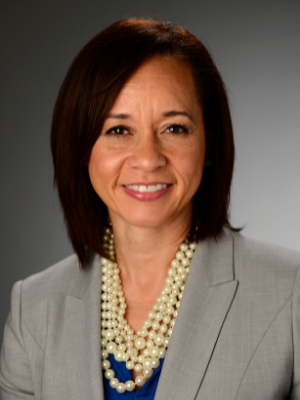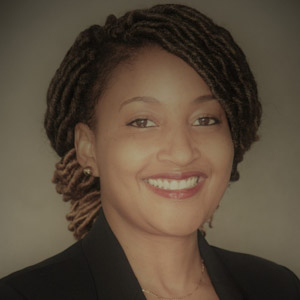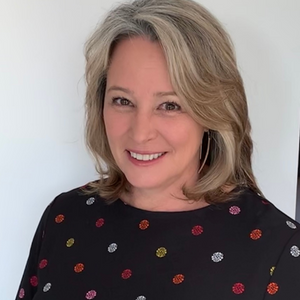Pamela Peace: Principal & North America Client Management, PGIM Fixed Income
 “The world is different now and leadership looks different,” says Pamela Peace, “Today anyone at any level should be afforded a trusted space to have a dialogue with their manager about the support needed to be successful.”
“The world is different now and leadership looks different,” says Pamela Peace, “Today anyone at any level should be afforded a trusted space to have a dialogue with their manager about the support needed to be successful.”
Peace talks about the values she holds dear, lessons learned throughout her career and how she has developed as a leader in ways that feel true to her goals, ambitions, and most importantly authentic to who she is as a person.
As a Senior Client Manager for PGIM Fixed Income, Pamela recently expanded her role as a leader within the organization, taking on responsibilities as lead manager for PGIM Fixed Income’s North America Client Management team: a role which she notes is intentionally focused on creating valuable partnerships for clients and opportunities for teammates in Fixed Income to deliver excellence in client relations.
Pamela reflects on driving change and rising above dissenting voices. “It is vital to perform well at our core duties to be viewed as credible and effective. What makes an individual a true leader? One who motivates and inspires others to perform well at their core duties, has the courage to push for change, and holds the unique ability to cultivate diverse perspectives.”
Her perspectives as Co-Chair of PGIM Fixed Income’s Culture Council highlight her commitment to amplify the organization’s cultural values.
Values She Holds Dear: Diversity of Perspectives
Having worked in fixed income and asset management for over twenty-five years, and with PGIM Fixed Income for the past seven years serving international clients in several regions of the world, Peace thrives on interacting with a range of people and cultures, from language to food. Even more, she loves experiencing the diversity of perspectives that come forth, and she learns broadly from every interaction in her job.
“We are a global organization. When we think about different investment strategies, we must consider every aspect of the world. We must take in various inputs – we must look at the world holistically, make decisions based on our analysis, clients’ expectations, what the markets are doing, geopolitical climate, regulatory, etc. These are just a few of many inputs that go into framing our decisions,” she reflects. “As a Client Manager, for a global asset management firm, I bring a wider awareness into everything I do. I believe it is core to my job and how I live in a global society.”
Peace is motivated by watching the people she leads develop uniquely in their skillsets and the legacy her commitment to talent will leave. “I’m so excited to see how the PGIM Fixed Income North America client managers, which consist of different generations, experiences, and cultures, are going to come together to bring forward new ideas for client engagement,” she says. “Our team embraces the view, ‘we can do hard things for our clients’, and if we believe we can do hard things together, that means we’re all thinking and bringing in ideas, and that’s going to be an exciting adventure.”
Lessons Learned: The Values of Humility, Constant Learning and Service
On advice for those developing their talents, she is open about her own path of development, “Trust me, I have made a lot of mistakes where I have had to say, that was not a good decision. Now, how can I actually take that and learn from it?” says Peace. “Humility allows me to understand where I am in my learning journey and acquiring more knowledge has been something I’ve had to own and develop personally.”
In her very first job at a naval base, she worked under an educator, who was a computer scientist, who imparted upon Peace that she could learn anything once you accept your ability to learn it. That woman, she noted, looked like her. Long before that, her mother, who raised eight children spanning twenty-two years as a single mom after becoming widowed, showed her the merits of hard work.
Combining those influences, Peace is a self-confessed constant learner who takes night courses to stay abreast on new topics in management and leadership. She’s presently taking courses to continue to improve on being an effective leader, as well as pondering the EMBA journey. Early on in her career, she learned there was value to admitting what you don’t know and being receptive to educational opportunities was essential – and that has stayed with her.
“I think vulnerability was important to getting me to this level in my career at PGIM, “she notes. “Also, having grace, humility, determination, and the curiosity to learn at any point in life are key attributes everyone should channel.”
She would add that being in service of others is a core value that has carried her through work and life: “My job is to serve others, and I wake each day reminding myself of that fact. In my job it is – PGIM’s clients first, the people working alongside me and those that I’m responsible for.”
In her personal time, she volunteers with aged people in underserviced areas and learns deep lessons from the elders she serves.
Lessons Learned: Leading as a Partner in Growth
A few years back, Peace had the experience of leading the London team and realized a lot about adjusting her communication and leadership style. Through that experience, she recognized the value of “meeting individuals where they are” to take them where you see they can go. This required adjusting her approach as a leader. When it comes to supporting her team now, Peace seeks to collaborate with those she leads on their development goals.
“The discussions I have with the individuals that work with me directly are very much: I am your advocate. I am your support. Let’s talk about what you need and where I think you need to grow. Then we’ll work together,” she says. “It’s an intellectual dialogue about development and being a partner and advocate in the space. It’s more of a leadership of equals as opposed to that of a hierarchy. Let’s come along as a partnership, and we’ll both get there and grow together.”
Every year in the annual reviews, Peace asks her direct reports to tell her one thing they want to learn or develop during that year, and she helps make that happen.
“They are accountable and feel as though they have ownership of their careers and development,” says Peace. “I’m there as a guide, support, and bumper when needed. That’s a valuable leadership skill that has worked for me.”
Not only does she see her own role as being supportive, but at this stage in her journey, Peace sees it as important to communicate to her own bosses what support she is going to need from them to be successful. Having the direct conversation cemented their willingness to commit that support.
“It’s important to be able to trust and communicate to your leaders: here’s what I need from you and what I need you to help me with,” she says. “That has made the difference for me in my career. And that is not wisdom that one must wait until they are well into their careers to acquire anymore. Remember, what I said at the outset of this interview, the world is different now, and leadership looks different.”
Both parties must agree and hold each other accountable but creating the space to have the conversation matters: “I know, it is a hard thing for some people to understand and accept – I must trust you enough to say, here’s what I’m looking for and here’s what I need. As managers, we must work to create the space for trust, and be ready to receive and act on the needs request.”
Developing as a Leader: Promoting Inclusion and Inspiring Women
Peace wants her team members to feel she brings positivity, openness, inclusivity, and a space of trust, where they can bring their best talents forward.
Inviting inclusion daily might mean giving people, who do not always get the opportunity to speak up on a call, a direct invitation to share their opinion or to lead a discussion. It is also being interested in her team as individuals outside of work. As Co-Chair of the PGIM Fixed Income Culture Council, she’s responsible for executing the values of the organization and creating a safe and inclusive environment built on collegiality, trust, and an unwavering commitment to clients among other positive attributes.
“Part of my responsibility, as a Co-Chair, is to model those values,” says Peace, “which includes bringing together our differences. Valuing people with different backgrounds and different skills to create diversity of thought to execute our mission, which often involves making a lot of subtle connections.”
Going back to her early career before PGIM, Peace lived the experiences, as a black woman, of being the “background individual,” there but not getting the opportunities, not receiving the speaking role, being trivialized. “Having had these experiences, I can say to young women who are coming into their careers, including my own daughter, you don’t have to take it. You do not have to shrink to the biases or comments that make you feel less than – change the norm and the direction of conversation,” she states. “Challenge the behavior appropriately – Ask the question, what does that really mean? Express when you’re offended and why, be prepared to have the conversation, receive the apology and extend grace if appropriate.”
She notes that she usually gives the benefit of the doubt and in most cases, believes there is value in having the hard conversations, because those questions often expose blind spots and lead to achieving a wider, more compassionate understanding of other’s lived experiences.
Developing as a Leader: Embracing Who You Are as a Person and Professional
Taking up distance running after age 40, Peace has completed four marathons and several half-marathons, and considers running outdoors to be spiritual.
Growing up in the middle of eight children gave her early life lessons in responsibility, navigating different personalities, taking care of each other, collaborating and valuing family – including her husband, adult son, and daughter.
She’s animated by new food, great wine with friends, the house she and her husband are remodeling, and she loves to dance. Peace recently cherished a holiday moment of karaoke and dancing with her daughter for the first time since her daughter was a child: “She is definitely smarter and has more rhythm, and that’s okay with me.”
It’s Pamela Peace’s lived experiences both inside and outside of work that define her as a leader and more precisely as someone who motivates and inspires those around her each day in service of PGIM’s clients.










